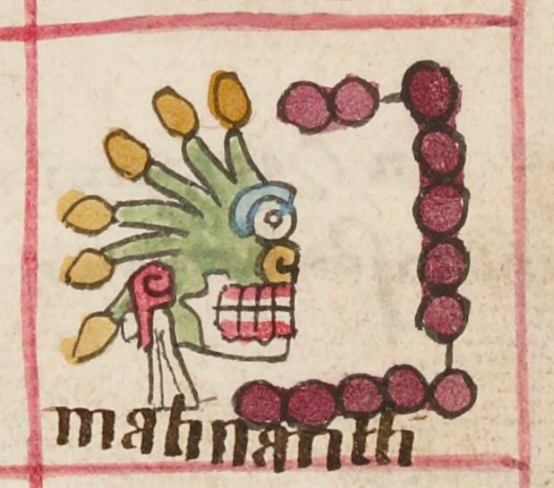malinalli (TR8r)
This element from a day sign in the Codex Telleriano-Remensis is the twisted grass sign (malinalli), which grows here like hair on the top of a skull and has yellow blossoms at the top of each blade. The eye of the skull is a round, wide open eye with a turquoise-blue band above it. Its nose cavity is yellow. Its teeth are white with red gums, echoing the coloring of some sacrificial thorns and flint knives. It has a curling red ear with a white tassel attached.
Stephanie Wood
The contextualizing image, below, shows that this sign is part of a date. As a date, malinalli could be a common name. Apparently, it was given to girls, and the sign came to serve the purpose of indicating the name Marina or María, nearly homophones for Malinal. Malinal- also appears as part of place names, such as is found in the Codex Mendoza (below). Two of these examples convey the twisted or entwined nature of the grass as it appears in many variations. The twisting and entwining of grasses suggests movement that would be required to have that result. According to James Maffie (2014, 482), Malinalli grasses represent motion, movement, and change. He writes that malinalli energy "initiates new olin-defined life~death cycles as well as feeds and renews existing olin-defined life~death cycles. Malinalli-shaped energy fuels the four-phased, olin motion-change of the Fifth Sun and all things in the Fifth Age. It is the shape of energy that nourishes humans, as well as plants, animals, Earth, Sun, rain, wind, fire, and Fifth Age." He continues: "If olin represents the pulsating heart beat of the Fifth Age, then malinalli represents the bloodstream and foodstream--the twisting arteries, veins, and entrails--of the Fifth Age." And: "Aztec artists conveyed the idea of malinalli using spirals, coils, twists, double helices, double-unfolding spirals, the xicalcoliuhqui, and the malinalli day sign glyph." As one can learn in our Online Nahuatl Dictionary, the Historia Tolteca Chichimeca (1976, 174) notes that the diphrase in nopalli, in malinalli is connected with bleeding and death.
Stephanie Wood (drawing from James Maffie)
malinantli
malinalli
Stephanie Wood
ca. 1550–1563
Jeff Haskett-Wood
twisted and entwined grasses, hierbas retorcidas y entrelazadas
This example of a carved stone hieroglyph representing the date Chicuace Malinalli (Six Twisted Grass, or 6-Twisted Grass) has a couple of details that it shares with the example from the Codex Telleriano-Remensis, above. The face has some features of a skull, such as prominent teeth. The skull has blades of grass coming off the top of its head (which distinguishes it from the day sign miquiztli). And the skull wears an earring. This stone carving is located on the Templo Calendárico at the Tlatelolco archaeological site. Photo by R. Haskett, 2 May 2025.
malinal(li), tall grass, twisted grass,
https://nahuatl.wired-humanities.org/content/malinalli
La Hierba Retorcida
Stephanie Wood
Telleriano-Remensis Codex, folio 8 recto, MS Mexicain 385, Gallica digital collection, https://gallica.bnf.fr/ark:/12148/btv1b8458267s/f41.item.zoom
The non-commercial reuse of images from the Bibliothèque nationale de France is free as long as the user is in compliance with the legislation in force and provides the citation: “Source gallica.bnf.fr / Bibliothèque nationale de France” or “Source gallica.bnf.fr / BnF.”







